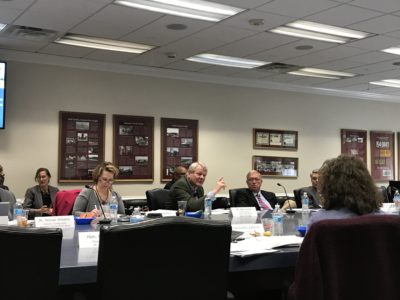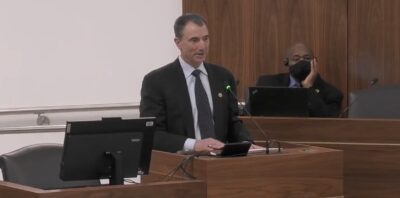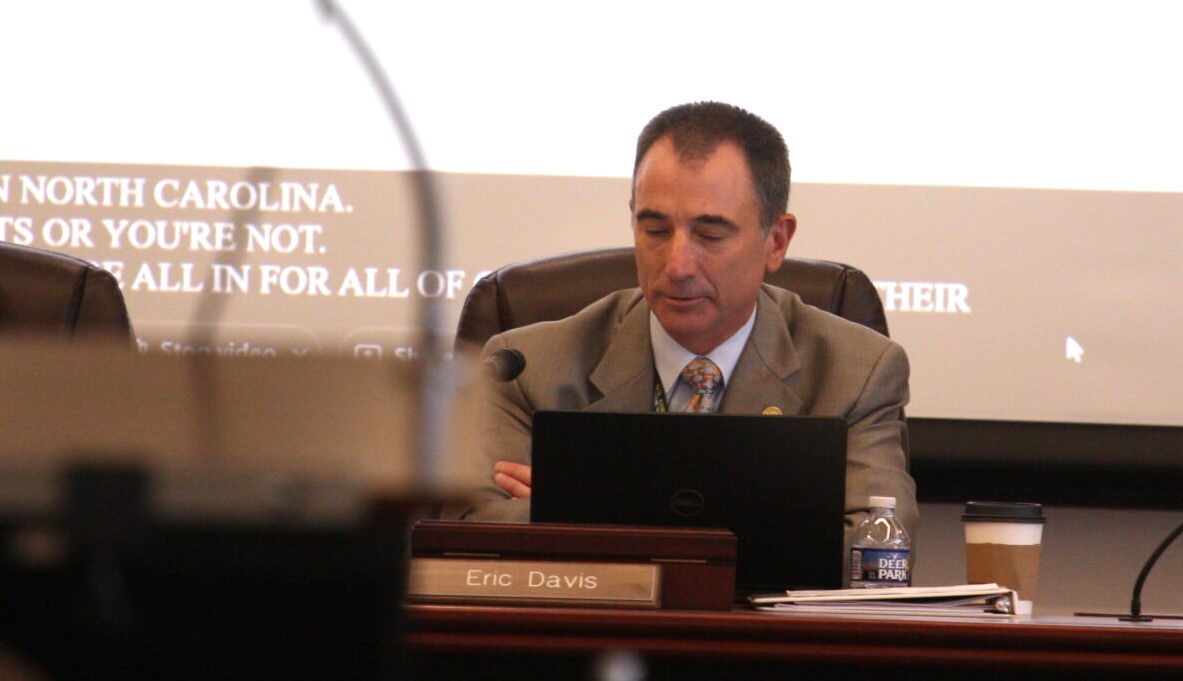
Share this story
- At the State Board of Education's August meeting, the Board approved a paid parental leave policy and heard new end-year data on literacy skills. K-3 students continue to gain literacy skills during the 2022-23 school year, the data show. #nced
- “The events in Raleigh this year have made it clear that there’s now no middle ground in public education in North Carolina – either you’re for our students or you’re not,” Chair Eric Davis said at the Board's August meeting. #nced
|
|
State Board of Education Chair Eric Davis urged the Board and public to take a stand for public education during his report at the Board’s meeting on Thursday – calling on them to go “all in” for North Carolina students.
“The events in Raleigh this year have made it clear that there’s now no middle ground in public education in North Carolina – either you’re for our students or you’re not,” Davis said. “And if you’re for our students, we must be all in for all of our students, and their teachers, and their principals, and their schools.”
North Carolina is in a critical time for public education, Davis said.
His statement comes toward the end of a legislative session that has been packed with bills that would reshape public education, ranging from how subjects are taught in classrooms to proposals that could threaten public school funding.
Davis previously published a letter raising concerns about some Republican legislative proposals, including the proposed expansion of the Opportunity Scholarships private school voucher program.
We’re facing extraordinary challenges, some self-inflicted obstacles. Now, more than ever, with the increasing emotional and mental struggles that our students face, they need us to be all-in. It’s imperative for the future of our state that this board and the department rededicate ourselves to being all-in for our students. So if you care about your students’ education, and education of all students in the state, and the future of the state, we invite you to join us in this endeavor.
Eric Davis, chair of the State Board of Education, said at the meeting
Davis’ statement came near the end of the State Board of Education’s meeting on Thursday, which also included an update on new literacy data and a paid parental leave policy.
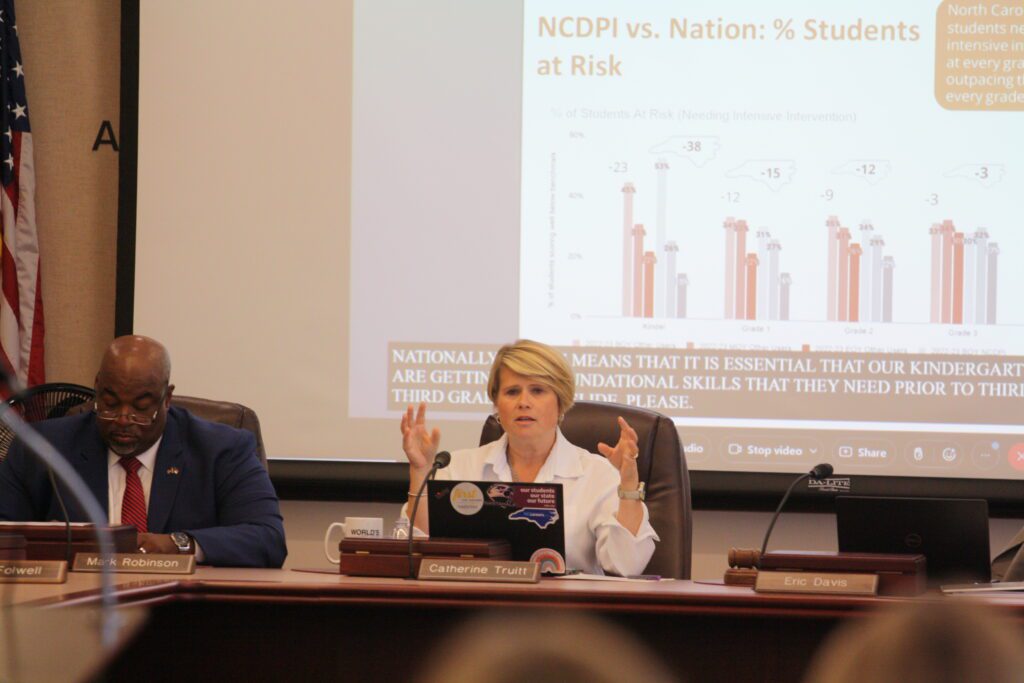
New data on literacy skills
K-3 students in North Carolina continued to make gains in literacy skills during the 2022-23 school year, according to new data from the Department of Public Instruction (DPI) – outpacing national growth rates in kindergarten, first, and second grades.
The end-of-year data, presented by State Superintendent Catherine Truitt at Thursday’s meeting, marks the end of the first full year of implementation of the Excellent Public Schools Act of 2021.
“North Carolina continues to close gaps. We’re continuing to see improvement from all grade levels, and continuing to see improvement across all subgroups,” Truitt said. “Overall, it’s incredibly good news for all students in our state.”
The data includes results from the Amplify DIBELS 8 Formative Reading Diagnostic Assessment, which measures things like fluency with letters and phonemes (the sound segments that make up a word), and word reading fluency and vocabulary. The data presented by Truitt includes composite scores of those different measures for each grade.
While the composite score offers valuable information about trends, pulling apart the scores is crucial for helping students, according to Susan Lambert, Amplify’s chief academic officer of elementary humanities.
“The one number can help you understand as an aggregate, how well is the system overall doing? And how well are we doing in terms of our literacy structure or our literacy program?” Lambert told EdNC. “But it’s not a good thing to look at for what individual students need.”
The Amplify data compares North Carolina’s results with 1.6 million K-3 students elsewhere in the nation taking the same assessment.
In April, DPI mid-year data showed that K-3 students showed growth in literacy skills from the beginning of the school year. That data also showed that the percentage of K-3 students needing intensive intervention also decreased at faster rates, with the exception of third grade.
The year-end data presented on Thursday shows those trends continuing.
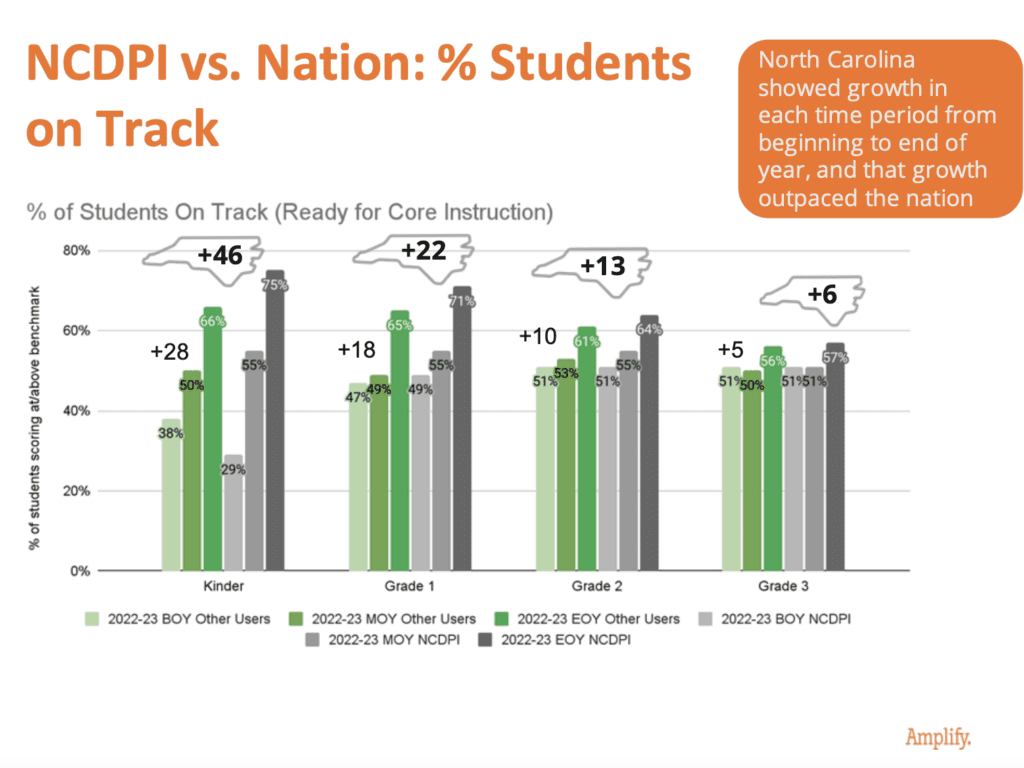
The percentage of students who measured “on track” more than doubled in kindergarten, according to the data, and increased by 22 percentage points in first grade and 13 points in second grade. Third grade increased by six percentage points in both North Carolina and in the national sample.
This year, nearly 25,000 more students are at and above the benchmark compared to the end of the 2021-22 school year, and there are nearly 17,500 fewer students below benchmark.
That improvement is even larger when compared to data from the beginning of this school year.
“We’re seeing 91,000 more students at or above benchmark, and 66,750 fewer students below benchmark,” Truitt said, “which is just an incredible shift.”
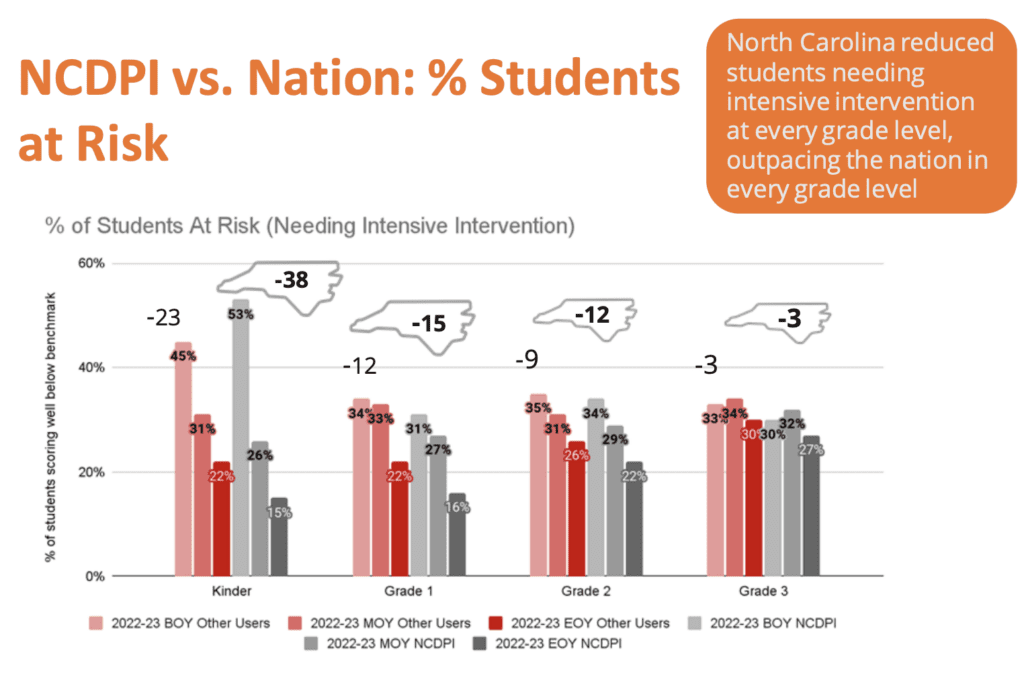
Truitt’s presentation also showed that every student subgroup – white, Asian, Black, Hispanic, and Native American/Alaskan native – grew at a faster rate than the national sample. The percentage of students needing intensive intervention also decreased in each subgroup.
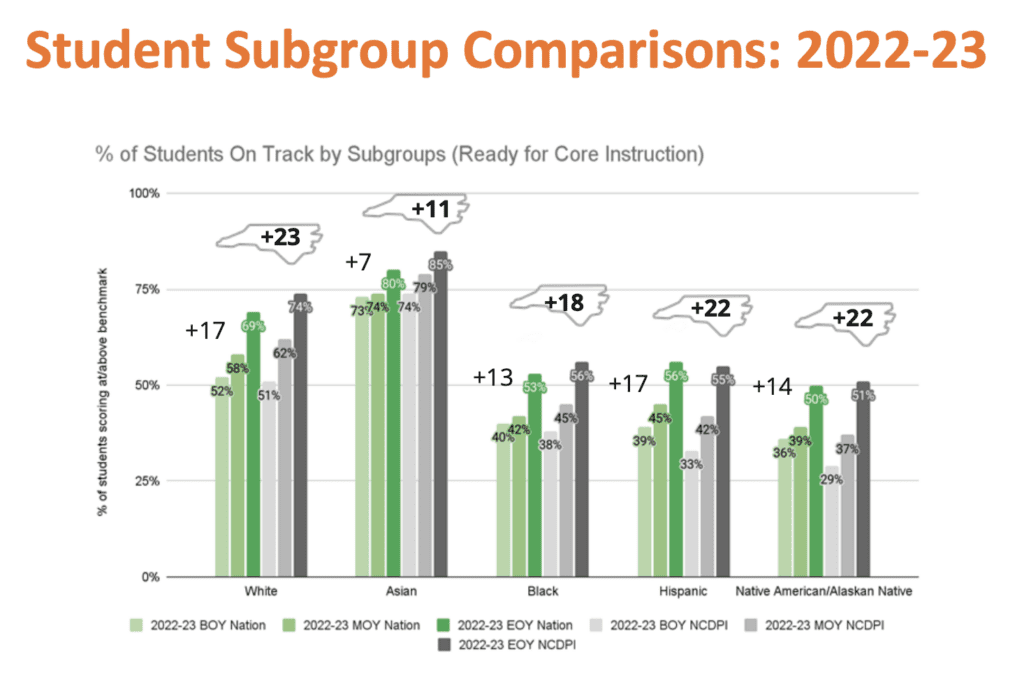
Truitt highlighted a few examples of the work being done across the state.
In Tyrrell County Schools, kindergarten and first grade each saw benchmark levels increase more than 29% from the start of the year to the end, according to Truitt’s presentation.
In Alexander County Schools, 80% of students are now at or above benchmark – up from 22% at the beginning of the year.
“North Carolina’s teachers and administrators have done an extraordinary job implementing this professional development in the classroom, and it’s clearly changing the trajectory of reading achievement for North Carolina’s students,” Truitt said in a DPI release. “There is more work to do, but our state is well on its way to laying the foundational literacy skills that are critical for students to become strong readers.”
Background of literacy efforts
In 2021, lawmakers updated the Excellent Public Schools Act to emphasize the use of the science of reading to ensure students in elementary schools can read on grade level by grade three.
The “science of reading” refers to a body of research conducted by reading experts, especially cognitive scientists, on how we learn to read and how we read to learn. According to DPI, it is “evidence-based reading instruction practices that address the acquisition of language, phonological and phonemic awareness, phonics and spelling, fluency, vocabulary, oral language, and comprehension that can be differentiated to meet the needs of individual students.”
The 2022-23 school year is the first year implementation of science in reading in classrooms began, through the Language Essentials for Teachers of Reading and Spelling (LETRS) program. Deputy State Superintendent Michael Maher previously said it is likely that the state will fully know results from these efforts when students now in kindergarten reach third grade.
To date, 29 North Carolina school districts have completed the LETRS professional learning, with remaining districts expected to complete training by summer 2024.
In the meantime, the beginning of year (BOY) and middle of year (MOY) assessments can help individual schools – and the state as a whole – make sure they’re staying on track.
The state requires every teacher to administer the assessment using Amplify’s mCLASS tool at least three times a year — once at the beginning, once in the middle, and once at the end of the year. Some schools choose to administer the assessment more often than that.
The assessment results are meant to measure “the essential, foundational skills that students need to become successful readers,” per DPI. As such, the assessment is not comparable to statewide end-of-grade tests, which measure whether a student has mastered grade-level standards.
In fall 2021, DPI data showed that though there were gains in literacy since the heart of the pandemic, students remain behind where they were pre-pandemic. Thursday’s presentation did not include specific comparisons to before the pandemic.
What’s next?
As Truitt celebrated the end-year data on Thursday, she also noted the work left to be done.
Specifically, she noted that the rate of growth differed between student subgroups.
“We want to be very transparent about where there are still gaps,” Truitt said. “Because even though our students of color saw incredible gains, our white students started way behind also and they saw incredible gains … There’s still a gap there.”
Truitt said DPI is working to decrease such gaps by making sure all students receive core instruction in foundational literacy skills. Specifically, that means keeping students in core instruction as long as possible, to prevent students from being pulled for interventions that may not be necessary.
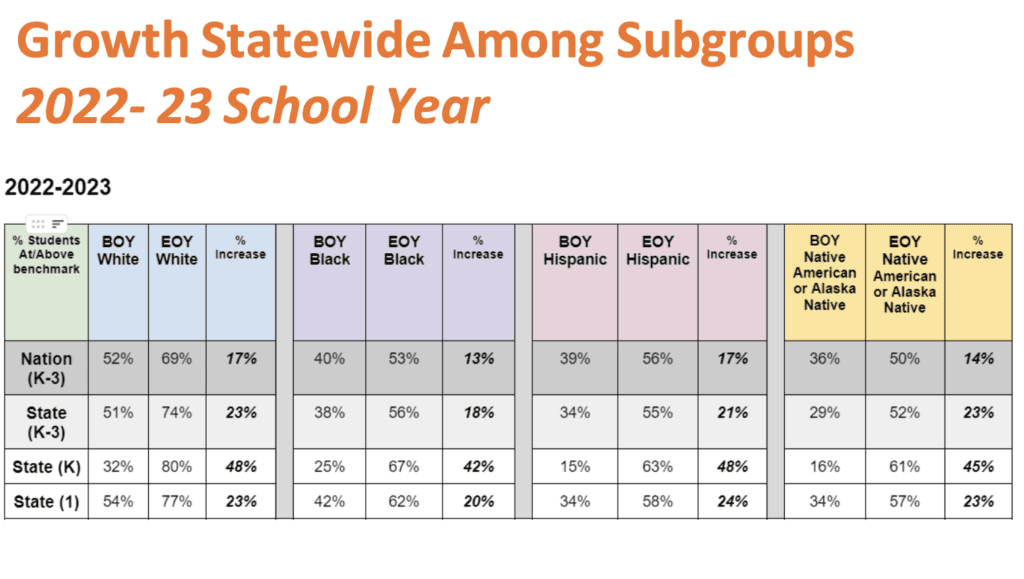
As the state continues to roll out LETRS training, DPI is also focused on trying to further increase skills for rising third and fourth graders.
Amy Rhyne, director of DPI’s Office of Early Learning, said students in kindergarten and first grade benefited the most so far from the state’s shift to instruction based on the “science of reading.”
“Our third-grade students didn’t have in-person learning for nearly one-and-a-half years,” Rhyne said in the DPI release. “Teaching sounds and attention to mouth formation to perform those sounds as a basic skill is nearly impossible in a virtual setting.”
You can view Truitt’s full presentation here.
Parental leave
The Board also approved temporary administrative rules regarding the paid parental leave mandated by Senate Bill 20. That section requires a paid parental leave policy for all state agency, public school, UNC, and community college employees.
On June 29, the General Assembly added technical corrections to the law, clarifying that a board of directors at a charter school can choose whether or not to provide paid parental leave, among other things.
The Board’s temporary policy closely follows the policy adopted recently by the N.C. Office of Human Resources (OSHR) and the State Human Resources Commission.
The policy allots up to eight weeks of parental leave for the parent who gives birth, and up to four weeks for other parents, including foster and adoptive parents, and legal guardians.
Part-time, permanent employees have the same option on a pro-rata basis, up to eights weeks for a parent who gives birth and up to four weeks for any other qualifying event. Before the technical corrections to the law, part-time employees were eligible for four weeks and two weeks, respectively.
The law also now clarifies that school employees can use annual leave, personal leave, or leave without pay in addition to the new paid parental leave.
The General Assembly appropriated $10 million in recurring funds to DPI to fund substitute teachers during paid parental leaves.
The law applies to requests for paid parental leave for qualifying events occurring on or after July 1, 2023, DPI said.
Here are few other important parts of the State Board policy:
- Eligible employees include those hired to fill a permanent, probationary, or time-limited position. The leave will not extend to temporary employees or independent contractors.
- To be eligible, employees must have been employed by the public school unit without a break in service “for at least 1,040 hours within the previous 12-month period.”
- Leave is available only one time during the same 12-month period for an individual employee.
- Both parents must be allowed to take the leave at the same time even if they work for the same employer.
On Wednesday, the Board decided to remove a section from the temporary policy that would require teachers to provide a reason for personal leave in order to avoid the substitute deduction from their salary. The Board will vote on that item next month.
In the meantime, DPI will explore the legal recourse available to them in updating that rule.
“We need the best talent we can get in front of our children in the classroom, and we’re competing with every other industry,” Davis said. “I don’t have to say why I want to take a personal day. Our teachers – they’re professionals and they should have the same professional respect and courtesy.”
New Board advisors
Thursday’s meeting began with a celebration of the 2023 Teacher and Principal of the Year cohorts. Two of those members were also recognized as new advisors to the Board – Donna Bledsoe, the 2023 Principal of the Year, and Kimberly Jones, the 2023 Teacher of the Year.
The Board also recognized two other new advisors: Dr. Don Phipps, the 2023 Superintendent of the Year, and Josiah Jennings, the student advisor from Hillside High School.
Before introducing the 2023 Principals of the Year team, Bledsoe highlighted the range of experience among the school leaders, including insight from charter schools, rural and urban areas, and various school sizes and funding levels.
“We have worked throughout the state collectively to ensure the answers to questions are simply what is best for all of North Carolina students,” Bledsoe said. “It is our commitment to leverage the principalship to spotlight the great work of North Carolina public educators and the opportunities afforded to public education families.”
Other meeting items
The Board heard two reports on Restart schools, State Summary of Academic Gains in Restart Schools and Research Study: Learning Loss and Recovery in Restart Schools. The Restart program allows recurring low-performing schools to adopt charter school-like flexibilities.
There are currently 159 Restart schools in North Carolina.
The Board also discussed several policy amendments to the state’s licensure renewal requirements, approved by the Professional Educator Preparation and Standards Commission (PEPSC) at its July meeting.
Those amendments concern renewal requirements for educators with an expired CPL, and guidelines for the Lifetime License, among other things.
The Board meets next Sept. 6-7.



